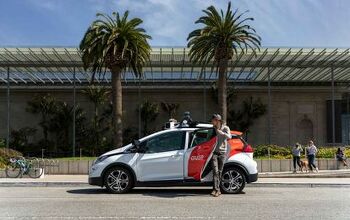Wells Fargo Fined $1 Billion For Auto Insurance Scandal, Mortgage Misdeeds

Wells Fargo is getting slammed with all kinds of penalties over shady business practices. Currently prohibited from growing its business as investigators look into its practices, the bank has restructured itself after it was implicated in widespread auto insurance and mortgage lending abuse in the summer of 2017. It’s also still coping with an earlier scandal involving local branches opening fake accounts for customers.
Last week, the Consumer Financial Protection Bureau and the Office of the Comptroller of the Currency suggested Well Fargo pay $1 billion to “resolve” the governmental probes into those issues. That changed today when the bureau filed a consent order announcing it was time for the bank to pay up.
The fine applies to the mortgage lending issues, as well as Wells Fargo’s past practice of charging thousands of auto loan customers for insurance they didn’t need and often didn’t even know about. The move caused some borrowers to default on their loans, resulting in their vehicles being repossessed. The consent order mandates that the bank remediate those customers.
The Consumer Financial Protection Bureau said it assessed a $1 billion penalty against Wells Fargo and credited a $500 million penalty collected by the Office of the Comptroller of the Currency toward the total fine.
While the fine is among the largest ever levied on a bank in the United States, analysts claim it won’t spell the end for the company.
“Operationally, Wells Fargo can recover, but reputationally and how a billion dollars will weigh on them — only time can tell,” Art Hogan, chief market strategist at B. Riley in Boston, told Reuters. “Companies have come back from worse than this but right now they’re still in the eye of the storm.”
Despite the bank’s shares taking a dive after the scandal became public knowledge in 2017, they appear to have stabilized somewhat within the last month.
Over 800,000 customers were believed to be affected by the auto insurance issue over roughly a four-year period. In August, Wells Fargo said it found that, in issuing auto loans, the bank charged some customers extra for collision insurance, even when customers already had it in their policy. President Donald Trump said federal agencies needed to go after the bank hard to set an example.
Afterward, the Federal Reserve mandated that Wells Fargo could not grow its business until it fixed its multitude of problems (and offered proof). The $1 billion penalty is the largest the Consumer Financial Protection Bureau has ever issued.

A staunch consumer advocate tracking industry trends and regulation. Before joining TTAC, Matt spent a decade working for marketing and research firms based in NYC. Clients included several of the world’s largest automakers, global tire brands, and aftermarket part suppliers. Dissatisfied with the corporate world and resentful of having to wear suits everyday, he pivoted to writing about cars. Since then, that man has become an ardent supporter of the right-to-repair movement, been interviewed on the auto industry by national radio broadcasts, driven more rental cars than anyone ever should, participated in amateur rallying events, and received the requisite minimum training as sanctioned by the SCCA. Handy with a wrench, Matt grew up surrounded by Detroit auto workers and managed to get a pizza delivery job before he was legally eligible. He later found himself driving box trucks through Manhattan, guaranteeing future sympathy for actual truckers. He continues to conduct research pertaining to the automotive sector as an independent contractor and has since moved back to his native Michigan, closer to where the cars are born. A contrarian, Matt claims to prefer understeer — stating that front and all-wheel drive vehicles cater best to his driving style.
More by Matt Posky
Latest Car Reviews
Read moreLatest Product Reviews
Read moreRecent Comments
- Jeff JMII--If I did not get my Maverick my next choice was a Santa Cruz. They are different but then they are both compact pickups the only real compact pickups on the market. I am glad to hear that the Santa Cruz will have knobs and buttons on it for 2025 it would be good if they offered a hybrid as well. When I looked at both trucks it was less about brand loyalty and more about price, size, and features. I have owned 2 gm made trucks in the past and liked both but gm does not make a true compact truck and neither does Ram, Toyota, or Nissan. The Maverick was the only Ford product that I wanted. If I wanted a larger truck I would have kept either my 99 S-10 extended cab with a 2.2 I-4 5 speed or my 08 Isuzu I-370 4 x 4 with the 3.7 I-5, tow package, heated leather seats, and other niceties and it road like a luxury vehicle. I believe the demand is there for other manufacturers to make compact pickups. The proposed hybrid Toyota Stout would be a great truck. Subaru has experience making small trucks and they could make a very competitive compact truck and Subaru has a great all wheel drive system. Chevy has a great compact pickup offered in South America called the Montana which gm could make in North America and offered in the US and Canada. Ram has a great little compact truck offered in South America as well. Compact trucks are a great vehicle for those who want an open bed for hauling but what a smaller more affordable efficient practical vehicle.
- Groza George I don’t care about GM’s anything. They have not had anything of interest or of reasonable quality in a generation and now solely stay on business to provide UAW retirement while they slowly move production to Mexico.
- Arthur Dailey We have a lease coming due in October and no intention of buying the vehicle when the lease is up.Trying to decide on a replacement vehicle our preferences are the Maverick, Subaru Forester and Mazda CX-5 or CX-30.Unfortunately both the Maverick and Subaru are thin on the ground. Would prefer a Maverick with the hybrid, but the wife has 2 'must haves' those being heated seats and blind spot monitoring. That requires a factory order on the Maverick bringing Canadian price in the mid $40k range, and a delivery time of TBD. For the Subaru it looks like we would have to go up 2 trim levels to get those and that also puts it into the mid $40k range.Therefore are contemplating take another 2 or 3 year lease. Hoping that vehicle supply and prices stabilize and purchasing a hybrid or electric when that lease expires. By then we will both be retired, so that vehicle could be a 'forever car'. And an increased 'carbon tax' just kicked in this week in most of Canada. Prices are currently $1.72 per litre. Which according to my rough calculations is approximately $5.00 per gallon in US currency.Any recommendations would be welcomed.
- Eric Wait! They're moving? Mexico??!!
- GrumpyOldMan All modern road vehicles have tachometers in RPM X 1000. I've often wondered if that is a nanny-state regulation to prevent drivers from confusing it with the speedometer. If so, the Ford retro gauges would appear to be illegal.


































Comments
Join the conversation
I worked for WF for 5.5 years. I firmly believe the issues that are pervasive at WF and most likely the other large banks are a failure of the regulatory authorities in as much as they allowed the banks to get the size they are. We need regional banks. Yes, you get multiple people doing the same job, but they are decent paying jobs. IMHO we don't need 5 or 6 large banks: Chase, WF, Citibank, BOA, I am sure I am missing one or two. The beast is too large and has an insatiable appetite for stock price appreciation which gets more and more difficult to achieve. I for one, would not be upset if a decision was made to systematically begin dismantling these too large banking conglomerates that have the capacity to tank our entire economy. Nothing should be that big. One guys opinion.
During the Reagan administration, the policies and protections put in place by post Great Depression-era regulators were relaxed or erased. Some of them included that banks could not own insurance companies and strict limits on growth (or mergers). These men had seen what unregulated commerce could do to an economy (along with tone-deaf governmental policy). But that was in the 1930's. By the 1980's, all of those hard times had been forgotten, the people who wrote the policies were long dead... Add another 20 years to the calendars and we have the Great Financial Crisis, or Great Depression, Part Deux. In the wake of the GFC, the "Masters of the Universe", who nearly destroyed our economy (as we knew it) received no real punishment. Our government, forced to keep them afloat, propped up these companies so their management could go on living their fantasy lives. While at the same time, the domestic car companies got billions in loan guarantees, and the general public scorned them, even though these same companies made up 7-10% of GDP and produced something tangible... With little regulation in place and political parties that grovel for money, what's left to stop them? No real opposition, other than some scattered legacy regulations and maybe the CFPB... A billion bucks? Pocket change...